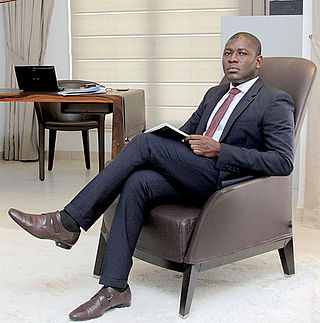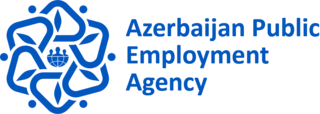The economy of Ghana has a diverse and rich resource base, including the manufacturing and exportation of digital technology goods, automotive and ship construction and exportation, and the exportation of diverse and rich resources such as hydrocarbons and industrial minerals.

Unemployment, according to the OECD, is people above a specified age not being in paid employment or self-employment but currently available for work during the reference period.
Unemployment benefits, also called unemployment insurance, unemployment payment, unemployment compensation, or simply unemployment, are payments made by authorized bodies to unemployed people. In the United States, benefits are funded by a compulsory governmental insurance system, not taxes on individual citizens. Depending on the jurisdiction and the status of the person, those sums may be small, covering only basic needs, or may compensate the lost time proportionally to the previous earned salary.

Ashesi University is a private, non-profit university located in Berekuso, near Accra. The mission of Ashesi University is to educate ethical, entrepreneurial leaders in Africa; to cultivate within students the critical thinking skills, the concern for others, and the courage it will take to transform the continent.

Before the arrival of European settlers, who introduced a formal education system addressed to the elites, education in Ghana was mainly informal and based on apprenticeship. Economic activities in pre-colonial Ghana were based on farm produce shared within households and members of each household specialized in providing necessities such as cooking utilities, shelter, clothing, and furniture, and trade with other households was therefore practiced on a very small scale. As such there was no need for employment outside the household that would have otherwise called for disciplines, values, and skills through a formal education system. After colonization, Ghana's economy became a hybrid of subsistence and formal economy.

A job guarantee is an economic policy proposal that aims to create full employment and price stability by having the state promise to hire unemployed workers as an employer of last resort (ELR). It aims to provide a sustainable solution to inflation and unemployment.
The Ohio Department of Job and Family Services (ODJFS) is the administrative department of the Ohio state government responsible for supervising the state's public assistance, workforce development, unemployment compensation, child and adult protective services, adoption, child care, and child support programs. Prior to July 2013, ODJFS was also the state agency responsible for the administration of Ohio's Medicaid program. In July 2013, a new state agency was created, the Ohio Department of Medicaid (ODM), Ohio’s first Executive-level Medicaid agency. ODJFS employs about 2,300 full time employees and has an annual budget of $3.3 billion.
The Labor policy in the Philippines is specified mainly by the country's Labor Code of the Philippines and through other labor laws. They cover 38 million Filipinos who belong to the labor force and to some extent, as well as overseas workers. They aim to address Filipino workers’ legal rights and their limitations with regard to the hiring process, working conditions, benefits, policymaking on labor within the company, activities, and relations with employees.

Youth unemployment is a special case of unemployment; youth, here, meaning those between the ages of 15 and 24.

Roland Agambire is a Ghanaian entrepreneur. He was the chief executive officer of Agams Holdings and the chairman and chief executive officer of the information and communications technology company Rlg Communications.
Statistics on unemployment in India had traditionally been collected, compiled and disseminated once every ten years by the Ministry of Labour and Employment (MLE), primarily from sample studies conducted by the National Sample Survey Office. Other than these 5-year sample studies, India has – except since 2017 – never routinely collected monthly, quarterly or yearly nationwide employment and unemployment statistics. In 2016, the Centre for Monitoring Indian Economy, a non-governmental entity based in Mumbai, started sampling and publishing monthly unemployment in India statistics.

Azerbaijan Public Employment Agency (APEA) is the state institution that implements various state policies in the field of ensuring full employment. Ensuring the employment of Azerbaijani citizens, the legal regulation of social protection of the unemployed and job-seeking citizens involve the National legislation and normative base consists of State Programs on socio-economic development, international agreements to which the Republic of Azerbaijan is a party, the Constitution of the Republic of Azerbaijan, the Law of the Republic of Azerbaijan on Employment, Unemployment Insurance and other relevant normative legal acts.
Accra Technical Training Center (ATTC) is a technical/vocational institution in Accra, Ghana.
The Nation Builders Corps, also known as N.A.B.C.O, is a Ghanaian initiative to provide jobs to unemployed post-secondary school graduates It was introduced by the government of Ghana.
Ghana has one of the highest rates of cybercrime in the world, ranking 7th in a 2008 Internet Crime Survey. The most popular form of cybercrime in Ghana is cyberfraud and is typically achieved via credit card fraud. However, recent decreases in universal credit card usage has seen the expansion of other cybercrimes such as blackmail and hacking. This growth in crime has warranted a government response, with policies specifically addressing the cyberspace being developed. This has necessitated various studies including a cyber security maturity study which was inaugurated by the Ministry of Communications and conducted by the Global Cyber Security Capacity Center (GCSCC) of the University of Oxford in collaboration with the World Bank.

Emmanuel Appiah born is a Ghanaian entrepreneur and Chief Executive Officer of Aireceive LLC, a technology company in Ghana. He is known to have developed an app to improve sanitation in Ghana and communicate without the use of internet.
The Ghana Enterprises Agency (GEA) is a Ghanaian government agency under the Ministry of Trade and Industry. The GEA is mandated by the Ghana Enterprises Agency Act, 2020 to promote and develop MSMEs in Ghana. It replaced the National Board for Small-Scale Industries (NBSSI).

The Government of Ghana initially responded to the virus through a nationwide disinfection and fumigation exercise which began in April 2020. In order to curb the spread of the virus, the government enforced lockdowns, aggressive contact tracing, public bans and social measures such as encouraging the wearing of face masks. By April, it began the gradual reopening of the country; lifting all lockdowns while maintaining protocols such as social distancing. Throughout the pandemic, the government partnered with the private sector in order to roll out economic reliefs and recovery programs as a result of the impact of the pandemic on Ghana's economy. There was also an expansion of medical facilities and the improvement of testing logistics.
Kingsley Kwaku Pinkrah is a Ghanaian social entrepreneur and business advisor. He has founded Cedi Ghana, an NGO that addresses poverty and youth unemployment in Ghana.








